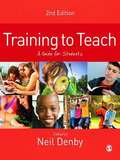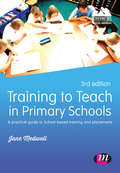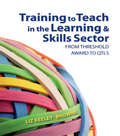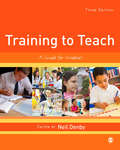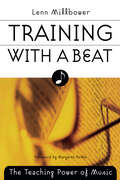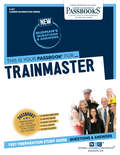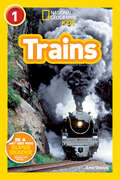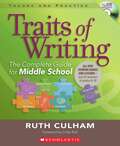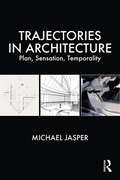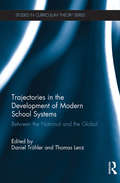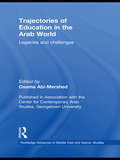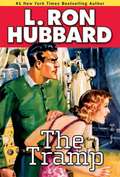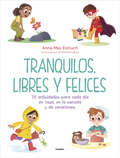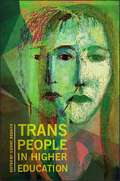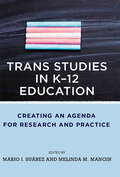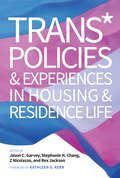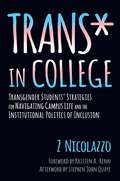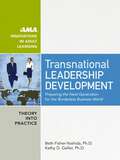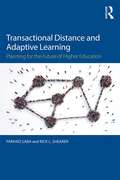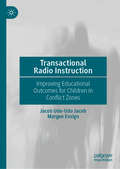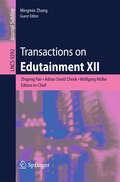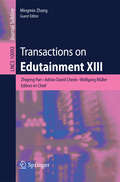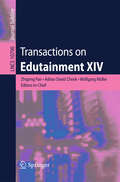- Table View
- List View
Training to Teach
by Neil DenbyTeaching is a tough and challenging job and society demands more from its teachers than ever before. This new edition is an essential companion for those training to teach providing an overview of important professional issues that all future teachers need to engage with in order to succeed in the classroom. Previously known as How to Achieve Your QTS, this Second Edition is equally valuable to those training to teach in both primary and secondary education and aims to give students the confident start they need in the classroom. Features new to this edition include more balanced primary education coverage and four new chapters on: child protection issues, teaching pupils with English as an Additional Language, cross-curricular teaching issues and your first teaching post: applications, interviews and induction. The accompanying Website www.sagepub.co.uk/denby, has been updated to include additional material expanding on and complementing the contents of the book. This book is essential reading for professional studies modules on both primary and secondary initial teacher education courses at both udergraduate and postgraduate level, and on university-based and school-based training courses. Neil Denby teaches at the School of Education and Professional Development, University of Huddersfield.
Training to Teach in Primary Schools: A practical guide to School-based training and placements
by Jane A MedwellFull of practical help and guidance, this is a must have for primary trainees on school experience, whether they are in a school-based or university-based teacher training programme. It begins by helping trainees to plan their own journey through training and beyond. Taking control of their own training in this way supports student teachers to approach the course with confidence, and secure their first teaching job. The book provides guidance on: adapting to working in school observing, planning and evaluating in school teaching on placement assessing, monitoring and reporting on children′s progress self-evaluation and how to pre-empt and resolve issues securing the first teaching job and succeeding in the NQT year For student teachers, the experience of school-based training is exciting but also challenging - this book supports them throughout and prepares them for the journey ahead. Student feedback on this book: "Having been on a variety of teaching placements myself, I know just how daunting and overwhelming experiences in school can be at times – even with a supportive mentor by your side! Hence, I felt that this book can smooth out and rectify those worries one may face during a school placement, and offers the reader a realistic insight into school experiences. In my opinion, the most useful chapter by far is the ‘Moving On’ chapter near the end of the book. This explains how to conclude a school placement, what to expect from an interview, and even how to set out a CV for a teaching position. This was not something I expected to find in this book however it was very much welcomed and is, in fact, a very important, valuable part of the book. This is the type of book you can buy on your very first day of teacher training and use well into your days as a newly qualified teacher." - Jasmin, Primary Teacher Trainee (University of Northampton)
Training to Teach in the Learning and Skills Sector: From Threshold Award to QTLS
by Liz Keeley-BrowneFirst published in 2006. Routledge is an imprint of Taylor & Francis, an informa company.
Training to Teach: A Guide for Students
by Neil DenbyTeaching is a tough and challenging job and society demands more from its teachers than ever before. This new edition is an essential companion for those training to teach, providing an overview of important professional issues that all future teachers need to engage with in order to succeed in the classroom. Aiming to give you the confident start you need in the classroom, this third edition is equally valuable to those training to teach in both primary and secondary education, and includes: • New chapters on: inclusion; school-based training; creativity; and digital technologies • Increased coverage of behaviour management • A new feature outlining the relevant Teachers’ Standards at the start of each chapter The accompanying website https://study.sagepub.com/denby3e, has been updated to include additional material expanding on and complementing the contents of the book. This book is essential reading for professional studies modules on both primary and secondary initial teacher education courses at both undergraduate and postgraduate level, and on university-based and school-based training courses. Neil Denby is recently retired from the School of Education and Professional Development, University of Huddersfield and now works as an independent educational consultant.
Training to Teach: A Guide for Students
by Neil DenbyTeaching is a tough and challenging job and society demands more from its teachers than ever before. This new edition is an essential companion for those training to teach, providing an overview of important professional issues that all future teachers need to engage with in order to succeed in the classroom. Aiming to give you the confident start you need in the classroom, this third edition is equally valuable to those training to teach in both primary and secondary education, and includes: * New chapters on: inclusion; school-based training; creativity; and digital technologies * Increased coverage of behaviour management * A new feature outlining the relevant Teachers' Standards at the start of each chapter The accompanying website https://study.sagepub.com/denby3e, has been updated to include additional material expanding on and complementing the contents of the book. This book is essential reading for professional studies modules on both primary and secondary initial teacher education courses at both undergraduate and postgraduate level, and on university-based and school-based training courses. Neil Denby is recently retired from the School of Education and Professional Development, University of Huddersfield and now works as an independent educational consultant.
Training with a Beat: The Teaching Power of Music
by Lenn MillbowerMusic holds amazing power over us. While it permeates and gives rhythm to our lives, most of us take it for granted and rarely consider its impact and potential. Training with a Beat is a lively introduction to understanding that force, and applying it to training.This practical "how-to" guide is written with the musical layperson in mind. The author reveals in straightforward language why music is a critical learning resource, explains the necessary concepts and terms, and concludes with vivid examples of practice and a list of suggested resources. He provides all the background and tools to enable trainers and educators confidently to use music to improve learning.A valuable and extensive appendix lists recommended CDs and offers track-by-track examples of potential training applications.Readers of this book will:Discover how music contributes to learning Understand music theory principles relevant to learningKnow how to select music appropriate for different training situationsDiscover effective musical games and activities and how they teachUnderstand the related legal and copyright issues This unique resource will be welcomed by trainers, facilitators, presenters and adult educators looking for additional tools to add impact to their material and improve learning outcomes.
Trainmaster: Passbooks Study Guide (Career Examination Series)
by National Learning CorporationThe Trainmaster Passbook® prepares you for your test by allowing you to take practice exams in the subjects you need to study. It provides hundreds of questions and answers in the areas that will likely be covered on your upcoming exam.
Trains (Readers)
by Amy ShieldsChoo Choo! Kids love trains! Especially the old-timey steam engines found in amusement parks and zoos. But what about a super-speeder in Japan that zooms on the track at 361 miles per hour? Or the world's longest freight train, stretching on for a whopping 4.6 miles? Or futuristic railways in the sky? In this level 1 reader, young readers will discover a whole new way of looking at trains!National Geographic supports K-12 educators with ELA Common Core Resources.Visit www.natgeoed.org/commoncore for more information.
Traits of Writing: The Complete Guide for Middle School
by Ruth CulhamEffective, easy-to-use tools for trait-based assessment and instruction―just for middle school teachers. Includes printable reproducible forms! The traits have revolutionized the way writing is taught. And nobody knows the traits better than Ruth Culham, who has written over 25 books and conducted countless workshops for teachers of all grades. Now, Ruth turns her expert eye to middle school. The Traits of Writing: The Complete Guide for Middle School contains classroom-tested materials developed just for teachers of grades 6-8. Brand-new scoring guides, scored sample papers, Think Abouts, warm-up exercises, focus lessons, and activities for each trait, organized by that trait's key qualities, make it easy to assess writing and deliver targeted instruction. With CD of reproducible forms that is compatible with interactive white boards. - The most comprehensive guide to trait-based teaching in middle school- An all-in-one resource for building a writing traits classroom, from the ground up- Useful trait-focused tips and tools that enable middle school teachers to hit the ground running- Research-based strategies, presented in a friendly, encouraging tone- The perfect companion to Culham's other trait resources
Trajectories in Architecture: Plan, Sensation, Temporality
by Michael JasperTrajectories in Architecture: Plan, Sensation, Temporality presents a compelling examination of underlying issues in late-twentieth-century architecture. Three formal preoccupations and conceptual orientations are used as guiding threads or trajectories. These three trajectories – the plan as conceptual device, a logic of sensation, and temporalities – serve to organise individual chapters in the central sections of the book and provide a new lens to the study of period work, revealing architectural conditions and consequent spatial effects little explored to date. Trajectories in Architecture adds to scholarship and expands our understanding of the role of conceptual and formal criteria in the analysis and creation of works of architecture. The book provides potentially transformative new interpretations of influential architects and key projects from the last half of the twentieth century to reveal new alignments and potentialities in architecture’s recent past as a contribution to identifying future possibilities. In so doing, the book argues for the still-latent potential in modern architecture’s traditions and design principles and their future expression. Trajectories in Architecture includes analysis of significant projects of Le Corbusier, Peter Eisenman, Zaha Hadid, John Hejduk, Louis I. Kahn, and I. M. Pei.
Trajectories in the Development of Modern School Systems: Between the National and the Global (Studies in Curriculum Theory Series)
by Daniel Tröhler Thomas LenzAs contemporary education becomes increasingly tied to global economic power, national school systems attempting to influence one another inevitably confront significant tensions caused by differences in heritage, politics, and formal structures. Trajectories in the Development of Modern School Systems provides a comprehensive theoretical and empirical critique of the reform movements that seek to homogenize schooling around the world. Informed by historical and sociological insight into a variety of nations and eras, these in-depth case studies reveal how and why sweeping, convergent reform agendas clash with specific institutional policies, practices, and curricula. Countering current theoretical models which fail to address the potential pressures born from these challenging isomorphic developments, this book illuminates the cultural idiosyncrasies that both produce and problematize global reform efforts and offers a new way of understanding curriculum as a manifestation of national identity.
Trajectories of Education in the Arab World: Legacies and Challenges (Routledge Advances in Middle East and Islamic Studies)
by Osama Abi-MershedTrajectories of Education in the Arab World gives a broad yet detailed historical and geographical overview of education in Arab countries. Drawing on pre-modern and modern educational concepts, systems, and practices in the Arab world, this book examines the impact of Western cultural influence, the opportunities for reform and the sustainability of current initiatives. The contributors bring together analyses and case studies of educational standards and structures in the Arab world, from the classical Islamic period to contemporary local and international efforts to re-define the changing needs and purposes of Arab education in the contexts of modernization, multiculturalism, and globalization. Taking a thematic and chronological approach, the first section contrasts the traditional notions, approaches, and standards of education with the changes that were initiated or imposed by European influences in the nineteenth century. The chapters then focus on the role of modern state-based educational systems in constructing and preserving national identities, cultures, and citizenries and concentrates on the role of education in state-formation and the reproduction of socio-political hierarchies. The success of educational reforms and policy-making is then assessed, offering perspectives on future trends and prospects for generating institutional and organizational change. This book will be of interest to graduate and postgraduate students and scholars of education, history, Arab and Islamic history and the Middle East and North Africa.
Tramp, The
by L. Ron HubbardExplore this fantastical tale. Down-on-his-luck tramp Doughface Jack has been shot while trying to escape from a cop and a train brakeman--causing him to fall from the train and crush his skull. A local doctor performs emergency surgery to save Doughface's life, patching up and stitching together the two halves of his brain and then sealing the cranium with a silver bowl.While Doughface miraculously survives, he also acquires phenomenal mental powers: he can instantaneously heal or kill, or make the old young. Terrified of his newfound abilities, Doughface flees the university where he was being kept for examination, only to cross paths with a vengeful and beautiful woman bound to reach the ultimate seat of power--using Jack to destroy anything that gets in her way! "...a series not to be missed by any true pulp-fiction fan." --Comics Buyers Guide
Tranquilos, libres y felices: 70 actividades para cada día en casa, en la escuela y de vacaciones
by Anna Mas Estruch70 actividades para los más pequeños de la casa en cualquier momento del día 70 actividades para acompañar a los niños desde el respeto, el amor y la libertad enfocadadas a respetar rutinas, hábitos de conducta y comportamientos adaptados a las necesidades de cada niño en particular. Potencian la autonomía, mejoran la autoestima y ayudan al niño a crecer como miembro activo de un grupo, entre sus propios compañeros del aula, en la familia o con amigosEl manual imprescindible para que los más pequeños de la casa jueguen, se diviertan y aprendan lejos de las pantallas.
Trans People in Higher Education
by Genny BeemynHonorable Mention, 2019 Foreword INDIES Book of the Year Award in the LGBTQ categoryWhile more trans students, faculty, and staff have come out on US college campuses today than ever before, many still report enduring harassment and discrimination. Others avoid disclosing their gender identity because they do not feel safe or comfortable at their schools. This groundbreaking book is the first to address their experiences in a single volume. Genny Beemyn brings together personal narratives and original research to give readers both individual and large-scale perspectives, which provide unprecedented insight into the experiences of trans people in higher education. These contributions reveal that despite an improving environment, trans people continue to face widespread interpersonal and institutional opposition on campuses across the country.Some of the first published research focusing on nonbinary trans undergraduates and trans graduate students is included here, in addition to the most comprehensive research to date of trans students at women's colleges and of trans academics. Trans People in Higher Education also examines the sexual health of trans students, the treatment of trans people by individuals with institutional authority, and the strategies and lessons learned from one college that successfully became more trans inclusive.
Trans Studies in K-12 Education: Creating an Agenda for Research and Practice
by Mario I. Suárez Melinda ManginA vital inquiry into trans issues in education, this compelling work argues for the design of education research, policies, and environments that honor all gender experiences and identities.Edited by two prominent figures in trans studies, Mario I. Suárez and Melinda M. Mangin, Trans Studies in K–12 Education brings together scholars and professionals representing a range of academic traditions, research methodologies, and career backgrounds to explore why and how schools should affirm gender diversity and challenge gender-based inequities.The collection offers a comprehensive examination of how gender is manifested in the educational context. Gathering a wealth of evidence, the book&’s contributors expose the prevailing norm of gendered environments, which are entrenched in the very design and execution of educational research. The collection also lays out a critical overview of US laws and policies related to gender equity, gender identity, and gender expression and how these frameworks impact educational environments. These findings draw attention to deficit-oriented, pathologizing ideologies that surround nonconforming gender identities and the detrimental, often traumatizing effects on transgender students and educators.Throughout, the contributors recommend methods for establishing gender-affirming research, policy, and practice. They outline the sociopolitical and legal pathways that trans and nonbinary students and school employees may use to secure education and workplace rights. They discuss the positive gains made by professional development for teachers, LGBTQ+ advocacy, and community programs that successfully support transgender and gender-nonconforming individuals.Ultimately, the volume highlights the promise of creating K–12 education spaces that are liberating rather than constraining.
Trans* Policies & Experiences in Housing & Residence Life (An ACPA Co-Publication)
by Jason C. Garvey, Stephanie H. Chang, Z Nicolazzo, Rex Jackson, Kathleen G. KerrCo-published with What are the institutional politics associated with fostering trans* inclusive policies? When formalizing a policy, what unanticipated challenges may emerge? How are students, particularly trans* students, influenced by the implementation of gender-inclusive housing practices and policies? Also, what are campus administrators and practitioners learning from their involvement with the development of trans* work on campus? Housing and Residence Life (HRL) plays an important role in the safety, well-being, and sense of belonging for college students, but gender-inclusive policies and practices in HRL are largely under-explored in student affairs and higher education publications. There are five key objectives that guide this book: 1. To promote and challenge student affairs and higher education staff knowledge about trans* students’ identities and experiences; 2. To support and celebrate the accomplishments of educators and professionals in their strides to promote trans* inclusive policies and practices;3. To highlight the unique role that housing and residence life plays in creating institutional change and serving trans* student populations;4. To demonstrate the value and use of scholarly personal narratives, particularly for narrating experiences related to implementing trans* inclusive policies in housing and residence life; and5. To create a strong partnership between scholarship and student affairs practice by developing an avenue for practitioner-scholars to publish their experiences related to gender-inclusive policies in housing and residence life and for others to use these stories to improve their practice. Administrators, educators, and student affairs staff will find this book useful at any stage in the process of creating gender- inclusive housing policies on their campuses.
Trans* in College: Transgender Students' Strategies for Navigating Campus Life and the Institutional Politics of Inclusion
by Z NicolazzoWINNER of 2017 AERA DIVISION J OUTSTANDING PUBLICATION AWARDCHOICE 2017 Outstanding Academic TitleThis is both a personal book that offers an account of the author’s own trans* identity and a deeply engaged study of trans* collegians that reveals the complexities of trans* identities, and how these students navigate the trans* oppression present throughout society and their institutions, create community and resilience, and establish meaning and control in a world that assumes binary genders. This book is addressed as much to trans* students themselves – offering them a frame to understand the genders that mark them as different and to address the feelings brought on by the weight of that difference – as it is to faculty, student affairs professionals, and college administrators, opening up the implications for the classroom and the wider campus.This book not only remedies the paucity of literature on trans* college students, but does so from a perspective of resiliency and agency. Rather than situating trans* students as problems requiring accommodation, this book problematizes the college environment and frames trans* students as resilient individuals capable of participating in supportive communities and kinship networks, and of developing strategies to promote their own success. Z Nicolazzo provides the reader with a nuanced and illuminating review of the literature on gender and sexuality that sheds light on the multiplicity of potential expressions and outward representations of trans* identity as a prelude to the ethnography ze conducted with nine trans* collegians that richly documents their interactions with, and responses to, environments ranging from the unwittingly offensive to explicitly antagonistic.The book concludes by giving space to the study’s participants to themselves share what they want college faculty, staff, and students to know about their lived experiences. Two appendices respectively provide a glossary of vocabulary and terms to address commonly asked questions, and a description of the study design, offered as guide for others considering working alongside marginalized population in a manner that foregrounds ethics, care, and reciprocity.
TransNational Leadership Development: Preparing the Next Generation for the Borderless Business World (Adult Learning Theory And Practice Book Ser.)
by Beth Fisher-Yoshida Kathy D. GellerAs the business world becomes increasingly borderless, leaders and managers of all cultures are being called on with greater frequency to assume leadership roles in other countries or to lead diverse multicultural teams in their own countries. Transnational Leadership Development acquaints readers with the paradoxes and mental processes leaders need to relate successfully to people with different backgrounds, cultures, and societal identities. The book advises readers on how leaders may learn to see, feel, and experience the world with different lenses; take the necessary amount of time to reflect on what they know and what they need to know; find new ways to communicate; and be resilient in the face of this unique challenge. This powerful guide lights the way for those seeking to develop their people’s proficiency in leading globally.
Transactional Distance and Adaptive Learning: Planning for the Future of Higher Education
by Farhad Saba Rick L. ShearerTransactional Distance and Adaptive Learning takes a fresh look at one of the pioneering educational theories that accommodates the impact of information and communications technologies in learning. The theory of transactional distance (TTD) provides a distinct analytical and planning foundation for educators to conduct an overarching inquiry into transitioning from mass instructional and management systems in higher education to dynamic and transformational futures that focus on each individual learner. Based on the TTD, this pragmatic approach offers instructors, administrators, students, and other stakeholders a comprehensive planning method to assess the current state of their instructional, learning, and management practices and to develop alternative models to prescribe future improvements in their institution. This complex, self-organized, and adaptive method includes current and emergent properties of: hardware, software, and telecommunications systems that allow faculty, students, and administrators to communicate; instructional and curriculum systems that provide teaching and learning environments for faculty and students; and management, societal, and global systems that influence how institutions are supported, funded, and managed.
Transactional Radio Instruction: Improving Educational Outcomes for Children in Conflict Zones
by Jacob Udo-Udo Jacob Margee EnsignThis book offers an important addition to the growing literature on education in emergencies. In war situations or in the wake of natural disasters, children’s education is often significantly disrupted. This book demonstrates how the authors used radio and mobile technologies to improve educational outcomes for over 20,000 displaced and out-of-school children in northeast Nigeria at the height of the Boko Haram insurgency. Interactive Radio Instruction (IRI) programs typically interact with a functional classroom teacher. However, the transactional radio instruction strategy presented provides high-quality, safe, and sensitive education in war-torn societies, where there are no schools or teachers. Summarizing the research and lessons learned from a USAID-funded Technology Enhanced Learning for All (TELA) project in Boko Haram-ravaged northeast Nigeria, the book describes in detail an education-in-emergency strategy based on a “whole of community” approach, with radio and mobile tablets at its core.
Transactions on Edutainment XI
by Zhigeng Pan Adrian David Cheok Wolfgang Mueller Mingmin ZhangThis journal subline serves as a forum for stimulating and disseminating innovative research ideas, theories, emerging technologies, empirical investigations, state-of-the-art methods, and tools in all different genres of edutainment, such as game-based learning and serious games, interactive storytelling, virtual learning environments, VR-based education, and related fields. It covers aspects from educational and game theories, human-computer interaction, computer graphics, artificial intelligence, and systems design. The 24 papers presented in this 11th issue were organized in four parts dealing with: object reconstruction and management; graphics; VR/AR; and applications.
Transactions on Edutainment XIII
by Zhigeng Pan Adrian David Cheok Mingmin Zhang Wolfgang MüllerThis journal subline serves as a forum for stimulating and disseminating innovative research ideas, theories, emerging technologies, empirical investigations, state-of-the-art methods, and tools in all different genres of edutainment, such as game-based learning and serious games, interactive storytelling, virtual learning environments, VR-based education, and related fields. It covers aspects from educational and game theories, human-computer interaction, computer graphics, artificial intelligence, and systems design. The 25 papers presented in the 13th issue were organized in topical sections named: learning games and visualization; virtual reality and applications; 3D graphics technology, multimedia computing, and others.
Transactions on Edutainment XIV (Lecture Notes in Computer Science #10790)
by Zhigeng Pan Adrian David Cheok Wolfgang MüllerThis journal subline serves as a forum for stimulating and disseminating innovative research ideas, theories, emerging technologies, empirical investigations, state-of-the-art methods, and tools in all different genres of edutainment, such as game-based learning and serious games, interactive storytelling, virtual learning environments, VR-based education, and related fields. It covers aspects from educational and game theories, human-computer interaction, computer graphics, artificial intelligence, and systems design. The 19 papers presented in the 14th issue were organized in topical sections named: 3D modeling and visualization; image; e-learning and games; and miscellaneous.
